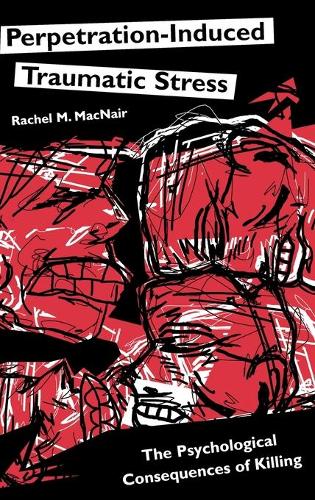
Perpetration-Induced Traumatic Stress: The Psychological Consequences of Killing
(Hardback)
Publishing Details
Perpetration-Induced Traumatic Stress: The Psychological Consequences of Killing
By (Author) Rachel M. MacNair
Bloomsbury Publishing PLC
Praeger Publishers Inc
30th August 2002
United States
Classifications
Tertiary Education
Non Fiction
Neurology and clinical neurophysiology
Abnormal psychology
616.8521
Physical Properties
Hardback
216
Width 156mm, Height 235mm
482g
Description
Introduces and builds a case for the concept that symptoms of Post Traumatic Stress Disorder can arise not just from being the victim of trauma, but also from being a socially acceptable cause of trauma or death, such as a soldier killing during war, an executioner killing an imprisoned criminal, or a policeman taking a life in the line of duty. This volume Introduces the concept of Perpetration-Induced Traumatic Stress (PITS), a form of PTSD symptoms caused not by traditionally expected roles (being a victim or rescuer in trauma), but instead by being an active participant in causing trauma. Sufferers of PITS may be in roles such as solider, executioner, or police officer, where it is socially acceptable or even expected for them to cause trauma including death. Scattered evidence of PITS is consolidated, its implications explored, and exciting potentials for future research suggested. All those interested in a thorough understanding of PTSD, or the psychological consequences of killing for those who do the killing, will find this book a key component. There appear to be greater severity and different patterns in symptoms for those affected by PITS, as compared to the more widely understood PTSD. There are obvious differences to be explored for those who kill in questions of context, guilt, meaning, content of dreams, and sociological questions. There are implications for therapy, for research into the causality of PTSD, and for violence prevention efforts. Disciplines including sociology, public policy, history, philosophy, and theology will also find applications for this material.
Reviews
[T]his is a very provacative book, rich in ideas, and definately worth a serious read.-Contemporary Psychology
MacNair makes a unique contribution to the literature. Highly recommended. Upper-division graduates and above.-Choice
"This is a very provacative book, rich in ideas, and definately worth a serious read."-Contemporary Psychology
"[T]his is a very provacative book, rich in ideas, and definately worth a serious read."-Contemporary Psychology
"MacNair makes a unique contribution to the literature. Highly recommended. Upper-division graduates and above."-Choice
Author Bio
RACHEL M. MACNAIR is Director of the Institute for Integrated Social Analysis, a research organization specializing in the connections between various social issues of violence.
